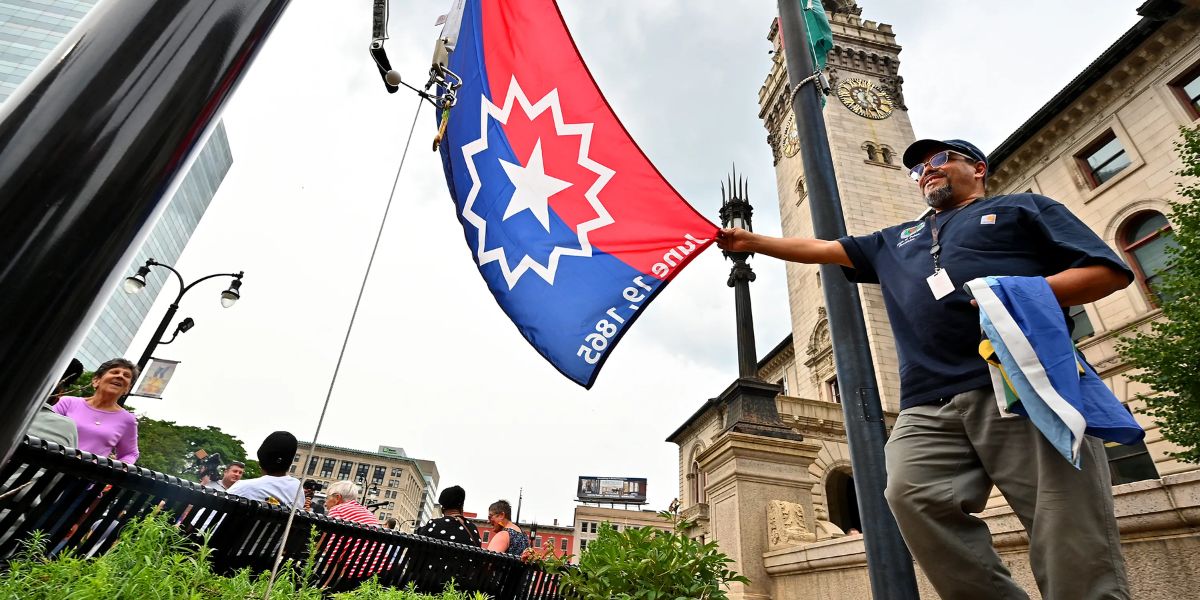VERONA, N.J. —
A Juneteenth flag was raised at Verona Town Hall on Monday morning in place of the American flag, prompting questions over adherence to federal flag code and New Jersey state law governing flag displays on public buildings.
Many are just asking a simple question, why?
The flag-raising ceremony, held outside Town Hall at 600 Bloomfield Avenue, marked Verona’s observance of Juneteenth, a federal holiday commemorating the end of slavery in the United States.
Despite steady rain, the town held a ceremony and assembly involving H.B. Whitehorne Middle School’s sixth-grade class.
Juneteenth, observed on June 19 each year, commemorates the end of slavery in the United States. It marks the day in 1865 when enslaved people in Texas were informed of their freedom, more than two years after the Emancipation Proclamation was issued. This year, as the holiday gains more national attention, the town’s decision to raise the Juneteenth flag is seen as a symbolic gesture of recognition and solidarity with the Black community.
The Juneteenth flag, designed by activist and artist Lisa M. J. McKoy in 1997, features a vibrant design that symbolizes freedom and pride. It includes a star representing Texas, where the last enslaved people were freed, and a burst that resembles a nova, symbolizing a new beginning. The colors—red, white, and blue—reflect the American flag, but the flag’s unique design highlights the importance of the Juneteenth celebration in the nation’s ongoing journey toward justice and equality.
Town officials have expressed that this act is about honoring history and providing a space for reflection. “We are committed to celebrating freedom and recognizing the struggles and contributions of Black Americans,” said the mayor during the flag-raising ceremony. “By raising the Juneteenth flag, we acknowledge the ongoing fight for equality and the significance of this day in our shared history.”
Mixed Reactions
While many residents and community members have applauded the move, others have voiced concerns. Critics argue that the removal of the American flag, even temporarily, is disrespectful to the country and the sacrifices made under its banner. Some feel that the American flag should represent all Americans, regardless of race or historical background, and that removing it for any reason undermines national unity.
Supporters, however, contend that raising the Juneteenth flag does not diminish the American flag but instead brings attention to an important chapter in American history that has long been overlooked. For them, this gesture is a way of elevating the conversation about racial justice and inclusion, ensuring that all parts of the nation’s story are told and honored.
The decision to replace the American flag with the Juneteenth flag aligns with the growing movement to officially recognize Juneteenth as a national holiday. In 2021, President Joe Biden signed a bill making Juneteenth National Independence Day a federal holiday, further cementing its place in the American consciousness. More cities and towns across the country are engaging in events and activities to mark the day, from educational programs and marches to community festivals.
This New Jersey town’s decision is part of a broader trend where local governments and organizations are grappling with how best to acknowledge America’s complex history. Raising the Juneteenth flag, for many, is an act of reconciliation, a chance to honor the struggle for freedom and the progress that continues to be made.
In addition to raising the flag, the town is hosting a series of community events throughout the week, including discussions on racial equality, film screenings, and performances by local artists. These initiatives are designed to engage residents in a broader conversation about Juneteenth, its significance, and the ongoing fight for racial justice.
As the town looks ahead to future Juneteenth celebrations, the hope is that this act of solidarity will spark continued dialogue about freedom, equality, and the values that define the United States. Whether or not residents agree on the flag’s placement, the important thing is that the town has started a conversation—one that acknowledges the past while encouraging progress toward a more inclusive future.
In the end, the Juneteenth flag’s placement outside the town hall serves as a reminder: history is not just something to be remembered, but something to be actively lived and reckoned with, in every community, every year.




